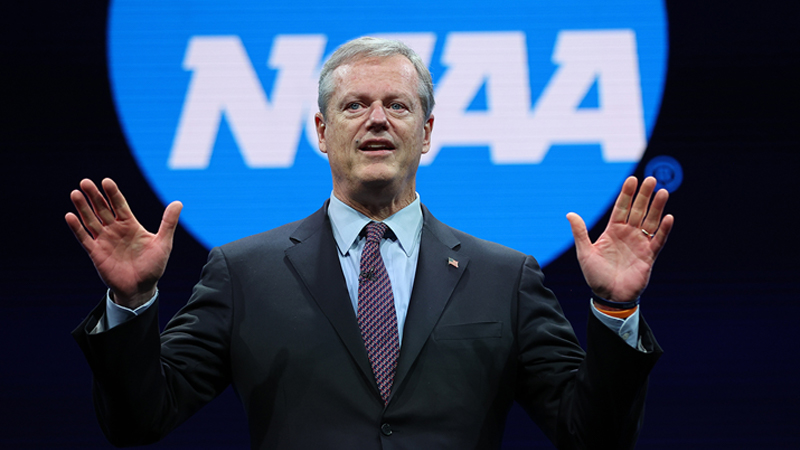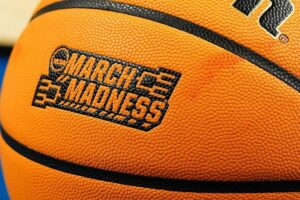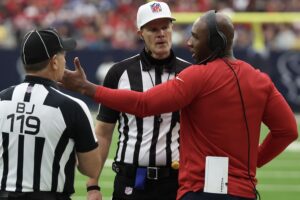NCAA President’s Speech Highlights Sports Betting Changes for College Athletics

National Collegiate Athletic Association President Charlie Baker recently delivered the keynote speech at the organization’s conference in Phoenix, Arizona. In the wide-ranging speech, he emphasized the organization’s commitment to athlete safety in the face of the increasing prevalence of legal sports betting.
Baker, who took office on March 1, 2023, expressed concern over the increased pressure placed on college athletes by sports betting. He highlighted the challenges athletes face, including intense scrutiny and sometimes hostile reactions from bettors on social media.
Throughout 2024, the NCAA will be focusing on monitoring and addressing the negative social media backlash directed at athletes, coaches, and officials. To this end, they have partnered with Signify, a data science company, to track and mitigate harmful online content directed at those involved in their tournaments.
One significant incident that Baker referenced was a credible and aggressive threat made to a team participating in an NCAA championship last year, which necessitated police protection.
During his speech, the former Massachusetts Governor also said the ongoing changes to sports betting regulations for athletes would continue, ensuring young athletes were not punished for innocuous betting activities outside their sport.
However, those who do cross the line, like several Iowa State athletes in 2023, will face full punishment.
“Sports betting is basically everywhere, especially on campuses. And the harm it can cause is real,” Baker said, as transcribed in an NCAA press release.
“Every conversation about the team, the competition, and the health and well-being of their teammates is not just chatter anymore, but currency for some and inside information for others.”
Growing the NCAA Fanbase, While Caring for Athletes
Alongside addressing sports betting concerns, Baker also spoke about the need for the NCAA to better engage with its fans online.
Recognizing that the majority of college sports followers are digitally connected, Baker announced the NCAA’s partnership with Kraft Analytics Group to build a comprehensive database of college sports fans.
This initiative aims to understand and interact more effectively with the fanbase, leveraging data in new ways to enhance the fan experience.
“It’s 2024, and most people who follow college sports are digitally online, and we have millions of people who come to our championships, and we don’t know hardly anything about them at all,” Baker said.
The NCAA has historically been opposed to sports betting. In fact, the Professional and Amateur Sports Protection Act, the 2018 repeal of which opened the floodgates for legal U.S. sports betting, was championed by the NCAA.
However, with 40 states now having legal sports betting, most recently sports betting in Vermont, the organization has increasingly recognized the tides have turned.
While not all states with legal sports betting allow betting on college football, for example, most do.
This means a large percentage of NCAA team fans could also be sports bettors. The org now has to tread the fine line between regulating what it sees as a potential threat to athletes’ well-being, and the extra participation, engagement, and dollars legal sports betting brings to market.
Working with Signify
In 2023, the NCAA published a number of studies on the issue of athletes and sports betting. That included a first-of-its-kind study on which it also partnered with Signify to analyze levels of abuse aimed at athletes on social media.
The work with Signify was ongoing, Baker said, and its ideas would soon be put into practice. He also noted that Signify had rolled out similar successful initiatives in the NBA and WNBA.
“Basically it tracks ugly, nasty stuff that’s being directed at people who are participating in their tournaments, and we’d use it the same way,” Baker said. “And it can shut it down or basically block it. And in some cases, even track back to where it came from.”
The NCAA sees this as a big issue. Yet, as the legal U.S. sports betting had a booming 2023, federal and state lawmakers have largely not considered it a priority to address.
Only regulators for sports betting in Ohio have been given more powers to tackle abusive bettors. In 2023, Buckeye State lawmakers gave regulators the power to ban sports bettors who harass athletes from all sports betting services in the state.
Baker also used his speech, given to some 2,000 NCAA members, to address other collegiate sporting issues. That includes signing a new eight-year deal with ESPN over broadcast rights, and more protections over Name and Image Licensing for student athletes.











